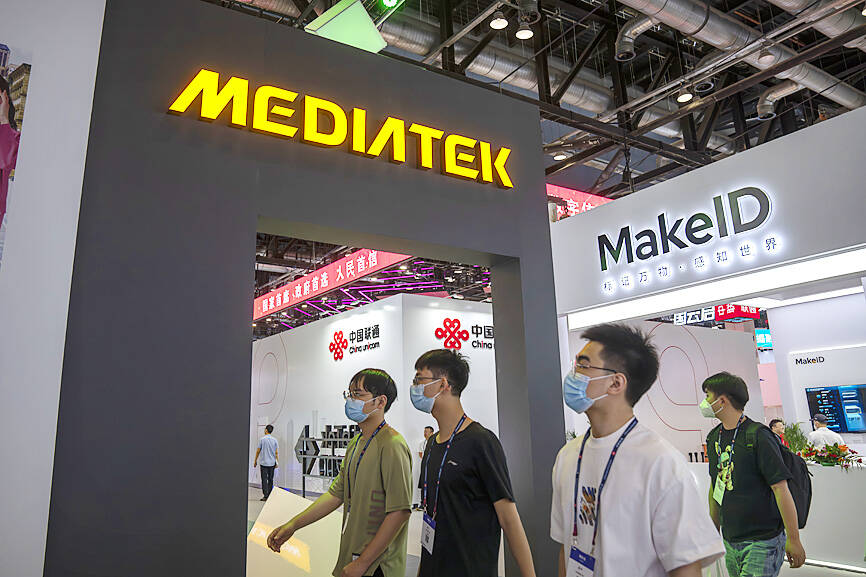MediaTek Inc (聯發科), the world’s biggest smartphone chip supplier, yesterday projected a sub-seasonal growth in revenue after reporting a 55 percent plunge in quarterly net profit last quarter due to a lengthy inventory correction cycle and sluggish smartphone demand mainly in China.
Net profit fell to NT$16.02 billion (US$510.35 million) last quarter, compared with NT$35.44 billion in the second quarter last year. Last quarter’s figure was the worst in about 10 quarters.
On a quarterly basis, net profit contracted 5.2 percent from NT$16.89 billion in the first quarter. Earnings per share dropped to NT$10.07 last quarter, compared with NT$22.39 a year ago, and NT$10.64 a quarter earlier.

Photo: AP
MediaTek expects revenue this quarter to pick up by between 4 and 11 percent sequentially to between NT$102.1 billion and NT$108.9 billion, slower than the quarterly growth of between 10 percent and 20 percent during a normal peak season.
MediaTek said it expects smartphones and Internet connection and power management chips to be the growth areas.
Gross margin this quarter would hold steady at about 47 percent, the same as last quarter.
“Recently, we observed that customer and channel inventories across major applications have gradually reduced to a relatively normal level. Recent demand from our customers has shown a certain level of stabilization,” MediaTek chief executive officer Rick Tsai (蔡力行) told an investors’ teleconference yesterday.
“However, our customers are still managing their inventory cautiously as global consumer electronics end market demand remains soft,” Tsai said.
As customers remain cautious about inventory management, revenue would grow moderately during the second half of this year, Tsai said.
Commenting on Huawei Technology Inc’s (華為) return to the 5G smartphone chip market, Tsai said MediaTek did not obtain a license to supply mobile phone chips to the Chinese company.
MediaTek does not expect major competition from Huawei, as the Chinese chipmaker focuses on designing chips used in premium models.
Offering a mid-to-longer-term business outlook, MediaTek said artificial intelligence (AI) applications would be a catalyst for semiconductor content and shorten the smartphone replacement cycle.
MediaTek is in “deep discussions” with potential customers to provide application-specific IC (ASIC) solutions, as most hyperscale datacenter operators are accelerating their chip development for generative AI solutions, Tsai said.
Specifically, the company is in talks with potential customers about providing advanced packaging solutions including CoWoS technology used in AI chips, he said.
It usually takes one-and-a-half to two years for such projects to yield results, Tsai said.
MediaTek said it did not generate revenue directly from AI chips, although most of its smartphone chips offer AI features.
MediaTek’s newly announced partnership with Nvidia Corp in the automotive chips area was also central to investors’ interest yesterday. MediaTek expects the collaboration to generate significant revenue by 2026.
A joint venture would not be created, it said.

Taiwan Semiconductor Manufacturing Co (TSMC, 台積電) yesterday said that its investment plan in Arizona is going according to schedule, following a local media report claiming that the company is planning to break ground on its third wafer fab in the US in June. In a statement, TSMC said it does not comment on market speculation, but that its investments in Arizona are proceeding well. TSMC is investing more than US$65 billion in Arizona to build three advanced wafer fabs. The first one has started production using the 4-nanometer (nm) process, while the second one would start mass production using the

A TAIWAN DEAL: TSMC is in early talks to fully operate Intel’s US semiconductor factories in a deal first raised by Trump officials, but Intel’s interest is uncertain Broadcom Inc has had informal talks with its advisers about making a bid for Intel Corp’s chip-design and marketing business, the Wall Street Journal reported, citing people familiar with the matter. Nothing has been submitted to Intel and Broadcom could decide not to pursue a deal, according to the Journal. Bloomberg News earlier reported that Taiwan Semiconductor Manufacturing Co (TSMC, 台積電) is in early talks for a controlling stake in Intel’s factories at the request of officials at US President Donald Trump’s administration, as the president looks to boost US manufacturing and maintain the country’s leadership in critical technologies. Trump officials raised the

‘SILVER LINING’: Although the news caused TSMC to fall on the local market, an analyst said that as tariffs are not set to go into effect until April, there is still time for negotiations US President Donald Trump on Tuesday said that he would likely impose tariffs on semiconductor, automobile and pharmaceutical imports of about 25 percent, with an announcement coming as soon as April 2 in a move that would represent a dramatic widening of the US leader’s trade war. “I probably will tell you that on April 2, but it’ll be in the neighborhood of 25 percent,” Trump told reporters at his Mar-a-Lago club when asked about his plan for auto tariffs. Asked about similar levies on pharmaceutical drugs and semiconductors, the president said that “it’ll be 25 percent and higher, and it’ll

CHIP BOOM: Revenue for the semiconductor industry is set to reach US$1 trillion by 2032, opening up opportunities for the chip pacakging and testing company, it said ASE Technology Holding Co (日月光投控), the world’s largest provider of outsourced semiconductor assembly and test (OSAT) services, yesterday launched a new advanced manufacturing facility in Penang, Malaysia, aiming to meet growing demand for emerging technologies such as generative artificial intelligence (AI) applications. The US$300 million facility is a critical step in expanding ASE’s global footprint, offering an alternative for customers from the US, Europe, Japan, South Korea and China to assemble and test chips outside of Taiwan amid efforts to diversify supply chains. The plant, the company’s fifth in Malaysia, is part of a strategic expansion plan that would more than triple